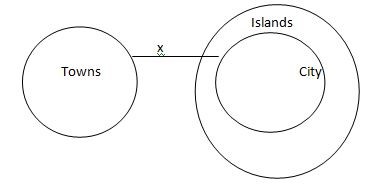Question
Statements:No town is a city. All cities are
islands. Conclusions:I. No island is a town. II. All islands are cities. In each of the questions below are given two statements followed by two conclusions numbered I and II. You have to take the given statements to be true even if they seem to be at variance with commonly known facts. Read all the conclusions and then decide which of given conclusions logically follows from the given statements disregarding commonly known facts. Give answerSolution
No town is a city (E) + All cities are islands (A) ⇒ Some islands are not towns(O*). Hence conclusion I does not follow. All cities are islands(A)⇒ Conversion⇒ Some islands are cities(I). Hence conclusion II does not follow. Alternate Method: 
The speed of a boat in still water is 10 km/h , and the speed of the stream is 2 km/h . How much time (in hours) will it take to travel 48 km down...
A boat sails 150 km in downstream direction in 5 hours. If the upstream speed is one-third of its downstream speed, calculate the time it will take to c...
A boat covers the distance between two points downstream in 2 hours and upstream in 3 hours. If the speed of the stream is 3 km/h, find the speed of the...
A boat travels 150 km downstream in 6 hours. The difference between its downstream speed and upstream speed is 3 km/h. What is the ratio of the boat's s...
A car has to cover a distance of 240 km in 30 hours. If it covers half of the journey in 3/5 th of the time, the speed to cover the remainin...
Speed of a boat in still water is 6 times more than the speed of stream. If boat covers 112 km in downstream in 8 hours, then find the time taken by the...
Speed of a boat in still water is 3 times more than the speed of stream. If boat covers 90 km in downstream in 6 hours, then find the time taken by the ...
A boat takes 24 hours to cover 'q' km in still water. While traveling downstream, it takes 16 hours to cover (q - 80) km. If the speed of the boat in st...
A man can row at 6 kmph in still water. If the velocity of current is 3 kmph and it takes him 8 hour to row to a place and come back, how far is the place?
- Boat ‘L’ moves 1.5 times faster than boat ‘K’ in still water. If both boats start at the same time from locations 270 km apart and move towards eac...
Relevant for Exams:



